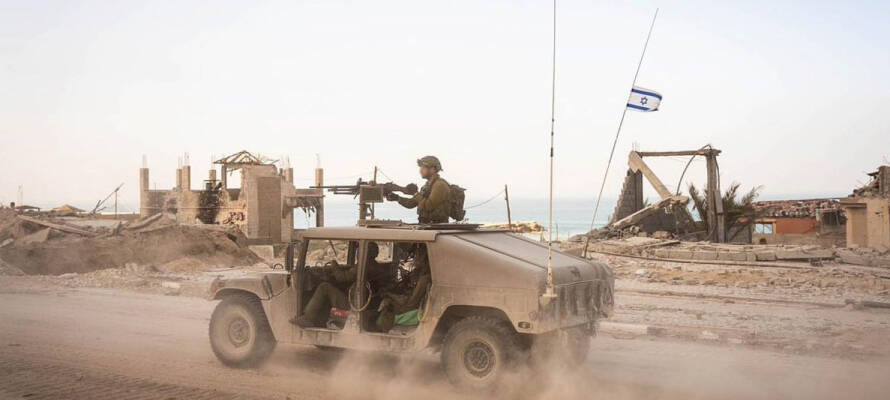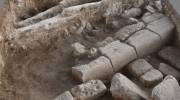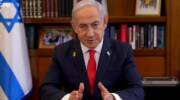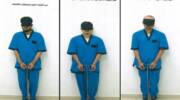‘We went from enjoying ourselves on this paradise beachfront to complete and total shock.’
By Etgar Lefkovits, JNS
When a 27-year-old Israeli university student vacationing in Thailand on Oct. 7 was determined to fly home to join his military reserve unit, he was given an unusual seat on the sold-out and overbooked El Al flight to Tel Aviv: the plane’s restroom.
“I felt for the first time that it was a war for our existence, and that we need to be here to protect our country,” Itay Kahana recounted in an interview with JNS on Sunday after completing nearly five months of reserve duty. “I had no second thoughts,” he added.
From paradise to firefight
On that fateful autumn morning, Kahana had completed a diving course on a Thai island and was lunching on Chicken Pad Thai on the beachfront when he and two friends got word via social media apps on their phones of the Hamas massacre underway in Israel. He quickly understood the situation was dire.
“It was the most surreal situation possible,” he recalled. “In one second, we went from enjoying ourselves on this paradise beachfront to complete and total shock.”
Concerned that the existence of the State of Israel was at stake, Kahana, who had no return ticket, bought a domestic flight from the southern Thai tourist island of Ko Pha-ngan, where a halfmoon party was underway, to Bangkok.
The airport was flooded with Israelis trying to get back home, but nearly all the flights to Tel Aviv were canceled, with the exception of the direct flights on El Al as well as a connecting route via Dubai, which had been flagged as a security risk due to the outbreak of war.
For three days, Kahana, who received an emergency call-up order from his IDF combat unit, desperately tried to get on an El Al flight, encouraged by his father, who said he would always regret it if he stayed in Thailand during such a fateful time. For 72 hours, he went back and forth from the airport to the city to sleep.
Finally, on the third day, 20 minutes before the midnight flight, an El Al stewardess told a group of reservists that she was taking 25 of them on the place even though it was overbooked, he recounted. Five were seated in the cockpit, five in the airline stewards’ seats and 15 in the plane’s washrooms.
“Of course with my luck, I got the washroom seat,” he said with a grimace.
The airline, which days later was chartered by the Israeli government to bring back reservists from around the world, charged him $650 for the one-way flight, he begrudgingly notes, which was later refunded by the military.
(His for-pay washroom flight seat left him angered at a recent El Al television advertisement, which received national and international plaudits, depicting reservists being flown home on the flagship carrier. The airline has also offered military personnel a free ticket to a European destination.)
During the eight-hour flight, Kahana walked the aisles, where other reservists were sleeping on the floor, and only had to take his assigned seat during takeoff, landing and times of turbulence. If he was in his washroom seat, he would redirect passengers to other restrooms unless it was for a quick freshening up.
The mood on the overnight flight was dour. He met a seated traveler, whom he had earlier seen in the Far East, whose farmer father was murdered during the Hamas invasion.
In the morning, he landed in an Israel at war.
Kahana, who lives in a village near the central Israeli city of Rehovot, raced to his military base not knowing if he would be sent to Gaza or to the northern border where Hezbollah was raining down missiles.
In the end, he was stationed near Ariel in Samaria amid concerns that Palestinians in other regions would join in on the violence. The day after he deployed, his unit engaged in an intense firefight with Palestinian gunmen near the village of Huwara, a hotbed of violence outside Nablus.
“A day before my flight I was getting a Thai massage and two days later I was being sprayed by an automatic weapon with 40 bullets at a distance of 100 meters,” he said.
No regrets
As he completes his reserve service next week and returns to civilian life and his university studies, Kahana said he would have made the same decision to immediately return home—select plane seat notwithstanding—“in a heartbeat.”
“We need to be here to protect our country,” he said. “Also, just being here we showed our enemies that they don’t break our spirit.”
He is looking forward to his next trip abroad to relax after things calm down, preferably with an upgrade.























